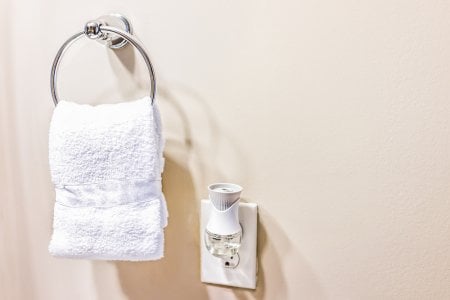Is Your Home Secretly Destroying Your Brain? Hidden Household Items to Watch Out For!
By
Seia Ibanez
- Replies 3
As we age, we often become more conscious of our health and the environment we live in. We try to eat better, exercise more, and take care of our mental well-being. However, there could be hidden dangers lurking in our homes that we might not be aware of—dangers that could be affecting our brain health without us even realising it.
A growing body of research is shedding light on the potential risks associated with everyday household items, particularly those that emit fragrances. These items, designed to keep our homes smelling fresh and clean, may be doing more harm than good.

The concern centres around volatile organic compounds (VOCs), which are chemicals that can evaporate into the air at room temperature. These compounds are found in many scented products, including plug-in air fresheners, scented candles, and even laundry products like dryer sheets and fabric softeners.
Dr. Marianthi-Anna Kioumourtzoglou from Columbia University warns that plug-in air fresheners, in particular, are not strictly regulated, leading to a wide range of ingredients and concentrations. The Environmental Protection Agency (EPA) cautions that VOCs can travel to the brain and cause short-term effects such as dizziness, headaches, concentration lapses, and visual disorders.
But the concerns don't stop there. Long-term exposure to these chemicals has been linked to more serious health issues. Researchers at the University of Texas Health Science Center at San Antonio found that synthetic fragrances used in household products can cause difficulties with attention, memory, and mood in susceptible individuals.
Lynn Wendt, an energy practitioner from Michigan, observed her friend struggling to find words during a conversation—a change she attributed to the new plug-in air fresheners in her friend's home. Wendt's experience, which she shared in a widely viewed TikTok video, underscores the potential cognitive effects of these chemicals.
Dr. Mikhail Varshavski, a New York-based physician, points out that burning candles can expose us to low levels of VOCs, some of which, like benzene and formaldehyde, are known carcinogens. Inhaling soot from candles can also increase the risk of lung cancer and respiratory diseases.
Another concern is phthalates, chemicals used in synthetic fragrances that can act as endocrine disruptors. These chemicals can impact hormone levels and aggravate allergy and asthma symptoms. Phthalates are found in scented candles and dryer sheets, and research has shown they can disrupt reproductive health, potentially leading to infertility and earlier reproductive senescence.
So, what can we do to protect ourselves and our homes from these potential risks? The Environmental Working Group (EWG) recommends looking for products with the EWG verified mark, which indicates safer ingredients. For laundry, consider using fragrance-free or naturally scented options, and avoid dryer sheets that contain quats, which can trigger asthma and may be toxic to the reproductive system.
When it comes to air fresheners, the Natural Resources Defense Council advises against their use altogether. Instead, they suggest opening windows to bring in fresh air or using fans to maintain air circulation. Remember, air fresheners mask bad odours but do not eliminate the chemicals that cause them.
As members of the Seniors Discount Club, it's important to stay informed about the products we use in our homes. By making conscious choices about the household items we purchase, we can help protect our brain health and overall well-being.

Have you experienced any adverse effects from scented household products? Or have you found safer alternatives that work for you? Share your experiences and tips in the comments below. Your insights could help fellow members make healthier choices for their homes.
A growing body of research is shedding light on the potential risks associated with everyday household items, particularly those that emit fragrances. These items, designed to keep our homes smelling fresh and clean, may be doing more harm than good.

Do you have plug-in air fresheners at home? It might bring you more harm than good. Credit: Shutterstock
The concern centres around volatile organic compounds (VOCs), which are chemicals that can evaporate into the air at room temperature. These compounds are found in many scented products, including plug-in air fresheners, scented candles, and even laundry products like dryer sheets and fabric softeners.
Dr. Marianthi-Anna Kioumourtzoglou from Columbia University warns that plug-in air fresheners, in particular, are not strictly regulated, leading to a wide range of ingredients and concentrations. The Environmental Protection Agency (EPA) cautions that VOCs can travel to the brain and cause short-term effects such as dizziness, headaches, concentration lapses, and visual disorders.
But the concerns don't stop there. Long-term exposure to these chemicals has been linked to more serious health issues. Researchers at the University of Texas Health Science Center at San Antonio found that synthetic fragrances used in household products can cause difficulties with attention, memory, and mood in susceptible individuals.
Lynn Wendt, an energy practitioner from Michigan, observed her friend struggling to find words during a conversation—a change she attributed to the new plug-in air fresheners in her friend's home. Wendt's experience, which she shared in a widely viewed TikTok video, underscores the potential cognitive effects of these chemicals.
Dr. Mikhail Varshavski, a New York-based physician, points out that burning candles can expose us to low levels of VOCs, some of which, like benzene and formaldehyde, are known carcinogens. Inhaling soot from candles can also increase the risk of lung cancer and respiratory diseases.
Another concern is phthalates, chemicals used in synthetic fragrances that can act as endocrine disruptors. These chemicals can impact hormone levels and aggravate allergy and asthma symptoms. Phthalates are found in scented candles and dryer sheets, and research has shown they can disrupt reproductive health, potentially leading to infertility and earlier reproductive senescence.
So, what can we do to protect ourselves and our homes from these potential risks? The Environmental Working Group (EWG) recommends looking for products with the EWG verified mark, which indicates safer ingredients. For laundry, consider using fragrance-free or naturally scented options, and avoid dryer sheets that contain quats, which can trigger asthma and may be toxic to the reproductive system.
When it comes to air fresheners, the Natural Resources Defense Council advises against their use altogether. Instead, they suggest opening windows to bring in fresh air or using fans to maintain air circulation. Remember, air fresheners mask bad odours but do not eliminate the chemicals that cause them.
As members of the Seniors Discount Club, it's important to stay informed about the products we use in our homes. By making conscious choices about the household items we purchase, we can help protect our brain health and overall well-being.
Key Takeaways
- Scented household items, such as plug-in air fresheners, have been linked to adverse health effects due to their volatile organic compound (VOC) content.
- Researchers caution that synthetic fragrances can impair attention, memory, and mood, underscoring the need to regulate such products more strictly.
- Common household products like scented candles, dryer sheets, and fabric softeners may contain chemicals that can cause allergies, respiratory issues, and reproductive health problems.
- It's recommended to minimise the use of artificially scented products, seek out items with lower phthalate levels, and prioritise natural ventilation over the use of air fresheners.







